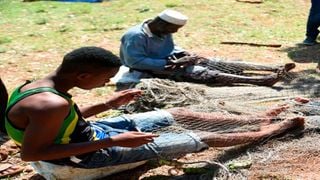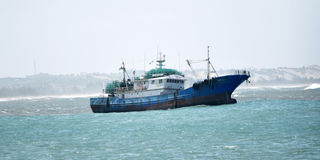
Fishermen prepare their fishing nets at Kibuyuni in Kwale County on July 2, 2021.
News
Premium
It’s a dog’s life for Kenyan fishermen as trawlers have a field day
What you need to know:
- In Kilifi County, over 200 boats could be fishing from the same spot in the Kilifi Creek.
Depending on how far from the shore a fisherman might go, they may get eight to 10kg of fish, translating to Sh1,700 if their sizes are small.
Kenyan fishermen have expressed fears that they will be locked out of earning their living in the Indian Ocean if the government imposes safety rules that will allow more foreign fishing vessels in the deep sea.
Having been fishermen for most of their lives, they now fear for the next generation as stiff competition from trawlers and stringent rules by the Kenya Maritime Authority (KMA) threaten to push them out of the sea.
Fisherfolk along the Coast are staring at a bleak future because they lack advanced equipment and do not adhere to some of the rules, said Ngole Mbaji, vice-chairman of Mtwapa Beach Management Unit (BMU) in Kilifi.
“For us, KMA and foreign fishing vessels are some of the major stumbling blocks. KMA has also introduced a series of safety regulations acting as barriers, which fishermen now claim intend to lock Kenyan fishermen from the Indian Ocean waters,” he said.
Because Kenyans lack modern required equipment for deep-sea fishing, foreign vessels have a field day in Kenyan waters while local fishermen remain on the shores near the creeks.
This is despite President Uhuru Kenyatta recently launching a Sh10 billion project, the Kenya Marine Fisheries Social Economic Development Project, aimed at uplifting the livelihoods of fishermen and ensuring that sea resources are harnessed, in what is called the blue economy.
Investigations by the Nation along the coastal strip have revealed that Kenyan fishermen are in misery. Besides being unable to fish in deep waters, fishmongers must buy fish from Chinese and other foreign-owned depots to sell it in the local market.
“All the fish that is in the market is from China. The women selling fish must wake up at dawn to go to the Chinese depots and purchase the fish, clean them and sell them in the market,” Mr Mbaji said.

Chinese fishing boats tied to trawlers at Malindi Beach in Kilifi County on July 2021.
He argued that though the sea is open for fishing and they have facilities such as cold storage, their targets are still not being met.
The government has also come up with rules that fishermen are finding it difficult to observe, due to associated high expenses.
KMA now wants operators of engine-powered boats must adhere to the International Convention on Standards of Training, Certification and Watchkeeping for Seafarers. It also wants the boats to undergo safety inspections and certification.
Coxswains who operate fishing vessels are required to undergo training at the Bandari Maritime Academy to get a certificate and licence to operate, and Mr Mbaji said the cost is too high as most fishermen live hand to mouth.
All these, he said, will cost them more than Sh100,000.
“What KMA have done is like putting smoke in a beehive. They are just using our weaknesses to remove us from the sea, to make way for these foreigners,” Mr Mbaji said.
Fishermen now say that because they lack the costly licences, they cannot get into the water. They will not be allowed to fish if they lack specific fishing gear, fishing nets and registration details for their boats.
Required nets
“We usually fish with monofilament, which floats in the water, but we have now been told that this affects corals when they go deeper in the waters. But this is not the case, the monofilaments that we use never sink, they have floaters” he explained, saying they have not money to buy the required nets.

Fishermen prepare their fishing nets at Kibuyuni in Kwale County on July 2, 2021.
Just like there are harvesting seasons for most crops, fish have seasons too. Mostly, the seasons are divided into two months each, with six a year.
Mr Mbaji and other fishermen from Mtwapa last season failed to get high yields from fishing. This is because many were arrested for “illegally” fishing in the water.
“During the high season we were not able to earn enough and right now no one has savings. The fishermen’s plan is usually that they work hard during the high season and then have enough savings that will take them through the low season when there is little or no fish,” he said.
This is happening even as the government invests resources in supporting local fishermen.
In February, Agriculture, Livestock and Fisheries Cabinet Secretary Peter Munya commissioned three powerful fishing vessels to Mombasa County for Sh60 million that was meant to allow local fishermen to take up deep-sea fishing.
But Ndago Gunga, the Mtwapa BMU secretary, said that though they have the boat at the station, they have not benefited from it.
“It was during the high season. We were very happy because we thought that we would get good returns from the many fish that we would catch in the deep waters,” he said.
“However, when we received it, we discovered that it did not have all equipment to function. It meant that our BMU had to raise about Sh1 million to get it fully operational, which was too much.”
The boat also requires extra costs like hiring a captain, a mechanic to fix it when it breaks down, and high maintenance and fuel costs that local fishermen say they cannot afford without support.
Things are not different for fishermen in Shimoni, Kwale County. With 700 fishermen at six the landing sites of Kijiweni, Kibuyuni, Ngomani, Kiromo and Mtimbani, none of them has a boat that will allow them to get high catches from the water.
“If you see someone with a large boat, it’s because they have borrowed from Vanga. But for us here, we can’t even go slightly further from the shores to fish,” said Omar Bonga, one of the fishermen.
They too must watch as foreign-owned vessels explore the water.

A Chinese fish shop at Malindi Town in Kilifi County.
The boats they use are small, allowing only two fishermen on board. They are propelled by hand using rows, putting them at risk of drowning in strong winds.
Moreover, the nets they use catch immature fish, affecting their breeding cycle.
“If these are the nets we are using and we fish in the same places every day, it means we are going to exhaust the fish even before they get mature. That is why we need to be provided with modern equipment to exploit the deep sea,” he said.
But with new regulations requiring a coxswain licence and inspection of fishing gear before they are used, fishermen see this as another great challenge.
They say they are waiting for KMA to provide details about how they should operate. This includes having trackers on their boats so that they are monitored when they are fishing in the deep sea. Among other things that their boats will be required to have are number plates and a Kenyan flag for easy identification.
But this is a major challenge for fishermen in Kwale County who can barely afford a good dhow.
Depending on how far from the shore a fisherman might go, they may get eight to 10kg of fish, translating to Sh1,700 if their sizes are small.
“With that, we have to eat fewer meals a day, because the money is not enough. It is even worse if a member of the family is sick or we are required to pay school fees,” he said.
Because of hard economic times, most Kwale residents have turned to fishing. This has brought fear in BMU members. Each one is now catching fish in the same area, creating a shortage.
The fishermen claim that with larger boats groups of six could be fishing in different directions to prevent overfishing in a small location. The fish also is sold at lower prices because of low demand and fewer guests in hotels, which were their main market.
In Kilifi County, over 200 boats could be fishing from the same spot in the Kilifi Creek.
The Nation was told that though the county government had come up with different projects in the fishing department, fishermen are excluded from the budget and policymaking. This has resulted in the heavily funded projects having little or no impact.
“How much is a fisherman going to spend? This is just a way to ask us, locals, to move from the waters and let the foreigners take charge of our waters. They have the boats and the equipment and get good catches that we as fishermen end up buying from them,” said Kilifi Creek BMU chairman ‘Captain’ Issa Shallo.
Sidelined
The fishermen said they have also been sidelined by KMA as calls to have the regulations revised have not yet been answered.
“There is a time they arrested some boys fishing in Malindi. We told them to slightly reduce the cost of inspection, because for a three-to-four-metre dhow, we are required to pay almost Sh8,000,” Mr Shallo said.
“We also asked them for more time to prepare for such abrupt stringent rules. KMA said they were going to discuss that and get back to us.”
He added that for a coxswain to be trained at the Bandari Maritime Academy, he needs at least Sh40,000 for two months. These fishermen cannot afford it as they live from hand to mouth.
“If I spend all that money for training, what is my family going to eat? Also, where am I likely to get the Sh40,000 for such training?” Mr Shallo said.
The new rules, he argued, are meant to let Chinese and other vessels to catch exotic fish for export. Each day, he said, they see either a Korean or Japanese vessel in the water.
“They later take the fish to their own artificial pools and export them. A Chinese vessel just docked after trawling the whole night,” he explained, pointing in the direction of the vessel.
Even as they anticipate the high season this August, Kenyan fishermen are worried that only foreigners will benefit from the waters.
It is said that they arrive in the deep sea between November and March during the peak and fish for almost six months. Their target is tuna, shellfish and prawns that are common and expensive delicacies in Asia.
This story is part of a Nation.Africa reporting series on the state of the fishing sector at the Coast region. Also read:






